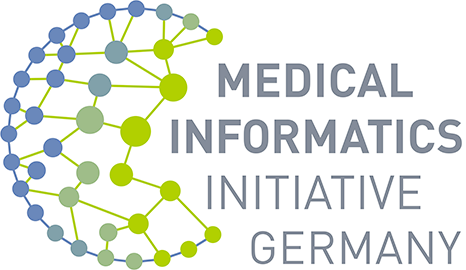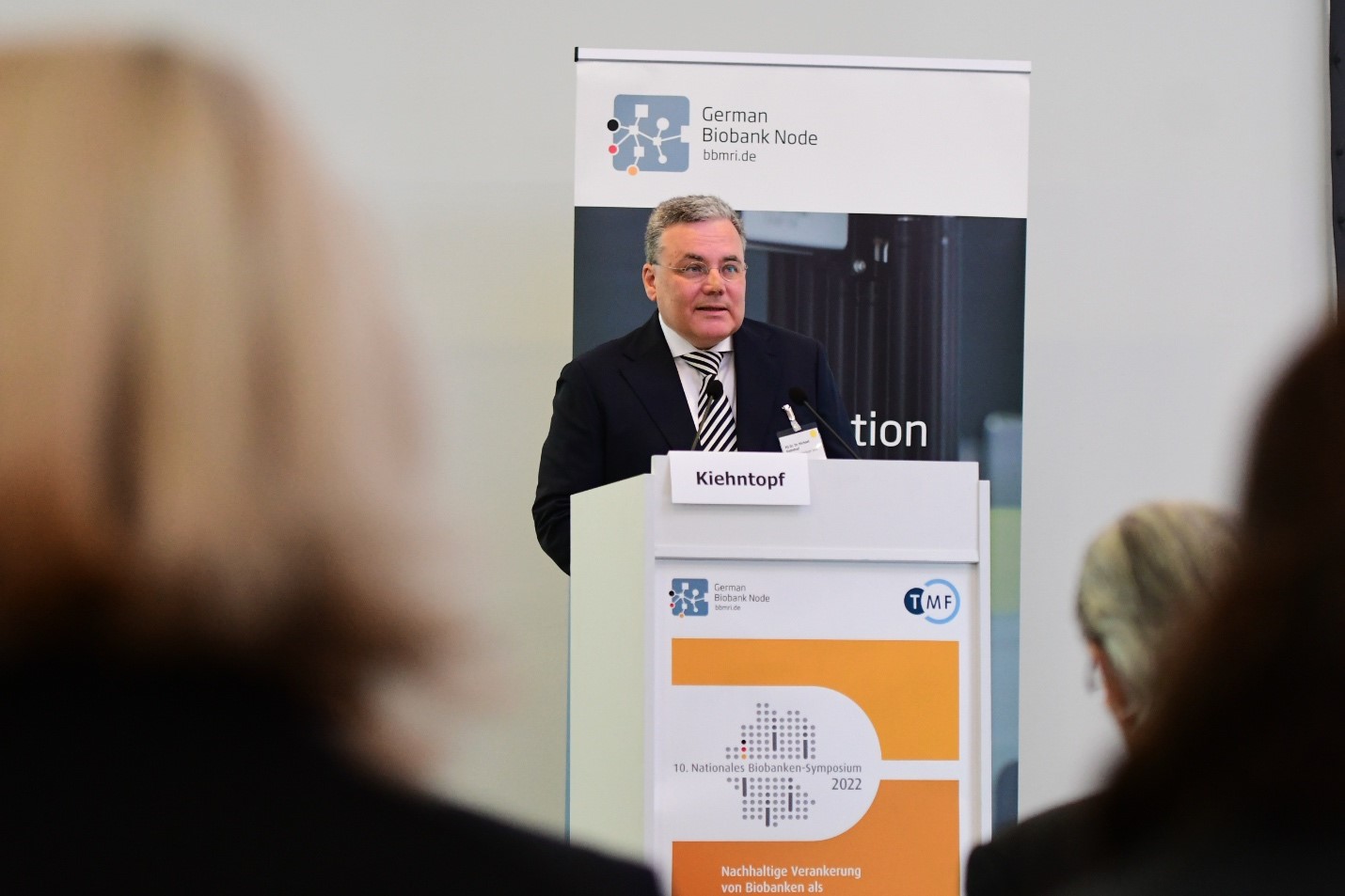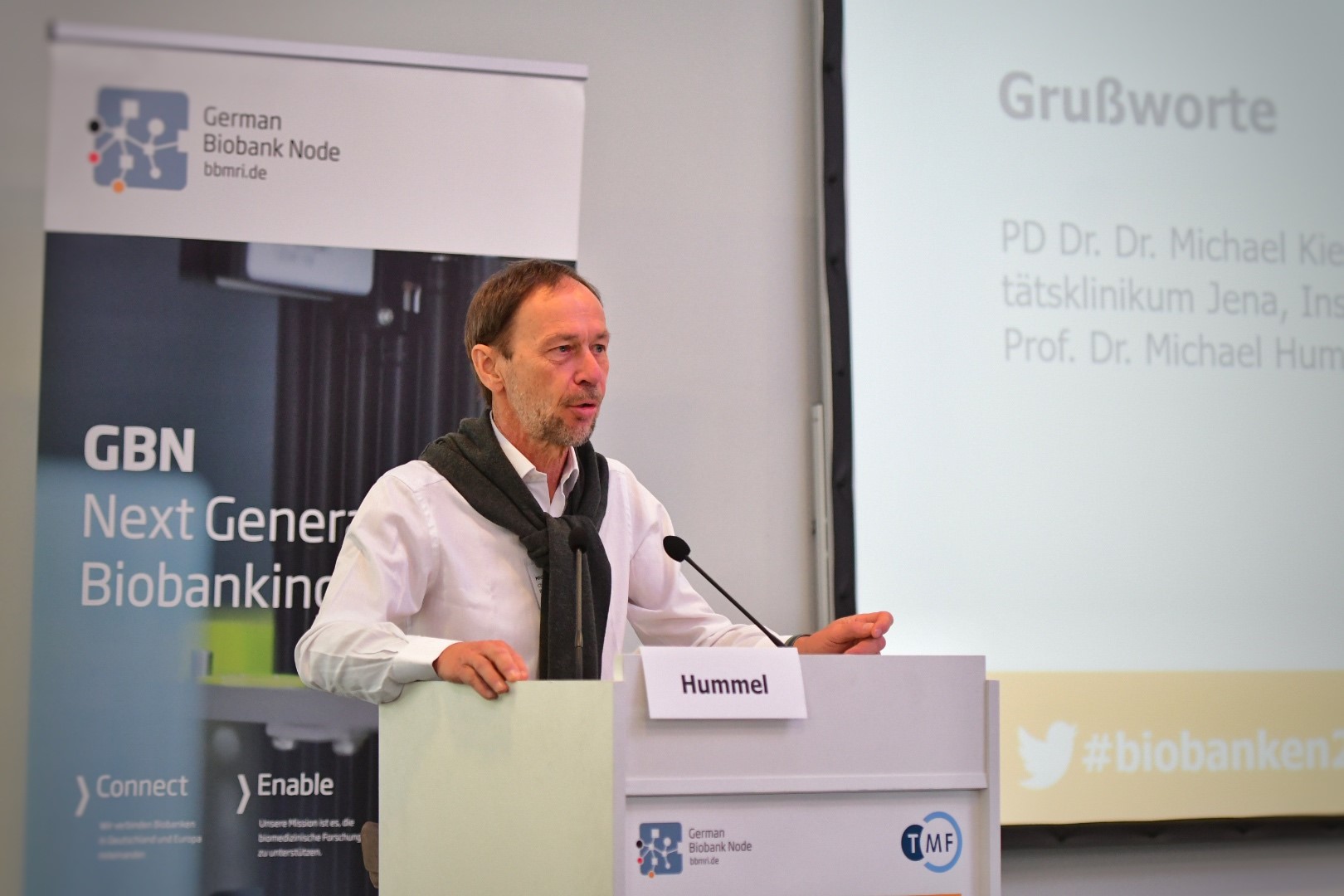
Berlin, 02/06/2022. Biobanks are a fundamental component of medical research. They collect, process and store biospecimens, such as blood or tissue, and make them available for research projects along with relevant data. "Modern biobanking stands for interdisciplinarity, professional sample handling and networked interoperability. The standardised cooperation of biobanks with one another and cooperation with networked, multicentre research initiatives plays a central role", said adjunct professor Dr. Michael Kiehntopf, conference president of the 10th National Biobank Symposium, on welcoming approximately 300 participants in Berlin. Under the motto “Embedding biobanks permanently in the research infrastructure", experts exchanged views on the latest developments in biobanking from the 1st to the 2nd of June 2022. The symposium was jointly organised by Technologie- und Methodenplattform für die vernetzte medizinische Forschung (TMF e.V. - Technology, Methods and Infrastructure for Networked Medical Research) in cooperation with the German Biobank Node (GBN).
Over the past decade, biobanks have developed into high-performance infrastructures for medical research. This is not least due to the innovative funding policy of the federal government and funding agencies, who were quick to recognise the importance of biobanking for ensuring that research is first-rate and reproducible. In recent years, the German Federal Ministry of Education and Research (BMBF) has invested heavily in networking biobanks. The German Biobank Alliance (GBA), which now comprises 37 sites, recently celebrated its fifth anniversary. "Biobanking provides centralised infrastructures, especially for collaboration in large research networks. This offers tremendous opportunities for health research", said Kiehntopf.
Biobanks in the network of large research initiatives
The benefits of effective biobanking were made particularly evident during the COVID-19 pandemic. For example, the NAPKON (national pandemic cohort network) belonging to the Netzwerk Universitätsmedizin (NUM - German Network of University Medicine) obtained approximately 420,000 biospecimens from over 5000 patients in three cohort studies. These are now being used to systematically analyse the long-term effects of COVID-19.
Copyright: TMF e.V.
In future, biospecimens and patient data from routine care will be made jointly available for research in the Medical Informatics Initiative (MII). To this end, the biobanks and data integration centres of university hospitals in Germany are connected on both a technical and regulatory level. To make this possible, the project Aligning biobanking and DIC efficiently (ABIDE_MI) was launched in May 2021. Participating members include 24 university hospitals, the MII Coordination Office and the GBN. "In future, the aim is for researchers in clinics to have a single point of contact. This will take the form of a request and analysis portal. It will be possible to identify patient cohorts and corresponding biospecimens that are suitable for a particular research project. Researchers will then be able to apply to use the data and samples", explained Sebastian C. Semler, TMF Managing Director and Head of the MII Coordination Office.
For quality in biomedical research
Funding agencies, such as the German Research Foundation (DFG), are aware of the importance of biobanks in safeguarding the quality of biomedical research projects and are therefore committed to more sustainable biobanking. “Quality-assured biobanking is an important prerequisite for obtaining meaningful research results in medicine and biomedicine. In 2021, the Permanent Senate Commission on Key Questions in Clinical Research published a guideline for applicants and reviewers that takes this aspect into account, along with other quality-improving measures", said Dr. Katja Hartig, Program Director of the Life Sciences 3: Medicine group of the German Research Foundation (DFG). "Additionally, when advising applicants, i.e. during the planning stages of projects, we strive to utilise existing professional biobanks and propose project-specific costs".
Linking the initiatives generates sustainability
Prof. Christopher Baum, Chair of the BIH Board of Directors and Chief Translational Research Officer at Charité, advocated even closer connections between existing research initiatives and structures. “We need stronger networking to produce research of higher quality, to improve the efficiency of research and raise the measurable benefits for patients. We must formulate a master plan of responsibilities to create sustainable links between the world of biospecimens, the Medical Informatics Initiative and the other relevant national and international infrastructures", emphasised Baum at the Biobanking Symposium.
Copyright: TMF e.V.
Similarly, GBN director Prof. Michael Hummel would like to see "coordinated networking, standardisation, harmonisation and further development of the existing infrastructures. In this way, the potential of the GBN and the Biobank Alliance could also be further developed, links to patient data achieved and long-term use of samples secured".
Growing importance of European networks
At a European level, biobanks have been connected by the European BBMRI-ERIC network since 2013. Approximately 700 biobanks from 23 European member states and the World Health Organisation (WHO) are connected through the BBMRI portal. This facilitates the pan-European exchange of biospecimens and data to advance medical research. "Germany has supported BBMRI-ERIC intensively and played an active role in shaping it from the very beginning. Within this network, GBN, GBA and TMF play pioneering roles at the European level", emphasised Prof. Jens Habermann, Director General BBMRI-ERIC. This commitment to European infrastructure development will become even more important in the future in view of the EU Commission’s plans to create a European Health Data Space for making medical data available for research.
More information:
Programme of the 10th National Biobank Symposium
Contact:
Wiebke Lesch (TMF e.V.), Tel.: +49 30 2200 24731, Mobil: +49 177 2663257, E-Mail: presse@tmf-ev.de,
Twitter: @tmf_eV
Verena Huth (German Biobank Node), Tel. +49 30 450 536 354, E-Mail: verena.huth@charite.de,
Twitter: @bbmri_de
Über die TMF e.V.
Die TMF - Technologie- und Methodenplattform für vernetzte medizinische Forschung e. V. ist die Dachorganisation für die medizinische Verbundforschung in Deutschland. Die TMF bringt Forschende unterschiedlicher Disziplinen zusammen, um gemeinsam Konzepte, Infrastrukturen und Methoden für die Forschung zu entwickeln. In der AG Biobanken werden Themen wie rechtliche, ethische und technische Rahmenbedingungen für Biobanken diskutiert. Insbesondere große Konsortialvorhaben und Leuchtturmprojekte wie aktuell die Medizininformatik-Initiative werden durch die TMF inhaltlich und organisatorisch durch eine Trägerschaft von Begleitstrukturen unterstützt. Mit der Bündelung von Ressourcen leistet die TMF einen wichtigen Beitrag zu einer effizienten medizinischen Spitzenforschung in Deutschland.
Über den German Biobank Node (GBN)
Der German Biobank Node ist die Dachorganisation akademischer Biobanken in Deutschland. Unter der Leitung von GBN arbeiten 37 Biobank-Standorte und ein IT-Entwicklungszentrum zusammen, um humane Bioproben und zugehörige Daten national und international für die biomedizinische Forschung verfügbar zu machen. Das Bundesministerium für Bildung und Forschung (BMBF) fördert die Arbeiten des GBN, der durch das Deutsche Krebsforschungszentrum Heidelberg (DKFZ) für den Bereich IT sowie die BioMaterialBank Heidelberg (BMBH) und die Integrierte Biobank Jena (IBBJ) im Bereich Qualitätsmanagement unterstützt wird. GBN vertritt die Interessen deutscher Biobanken im europäischen Biobanken-Netzwerk BBMRI-ERIC.



